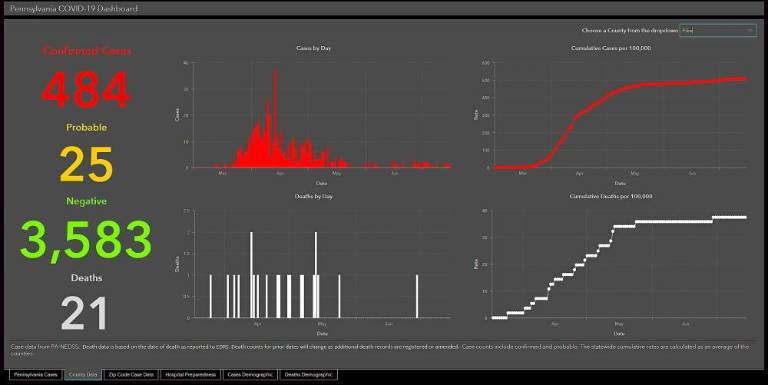Pike County in good shape even as ‘alarming escalation’ leads to tightened restrictions in PA
Pennsylvania. Nightclubs and bars that do not serve food were ordered closed on July 16, under Gov. Wolf’s order. Restaurants are limited to 25% capacity.

Pike County is now one of the safest places to be during the COVID-19 pandemic, says a local infectious disease specialist.
With only 12.6 cases per 1000,000 people over the previous 14 days, ”Pike is one of the best counties in the nation,” said Dr. Doug Manion of Milford during Monday’s Zoom update of the Milford Covid 19 Volunteer Task Force.
But in other parts of Pennsylvania, Manion said “the data is chilling, and there’s the need to increase restrictions” (see sidebar).
Manion credits Pike’s flattened curve to the “virtual alliance” forged by Pennsylvania, New Jersey, New York, and Connecticut at the start of the pandemic. The four states agreed to a shutdown of nonessential businesses and travel that lasted several months. The states also put into place social distancing and mask wearing requirements, and recently agreed on a travel advisory requiring visitors from the country’s many hotspots, like Alabama and Florida, to quarantine for 14 days after arriving in their states.
Pike is even doing well relative to other counties in the Poconos. Cases in Carbon and Monroe counties are “slowly creeping up,” he said. Carbon County has twice the rate of cases that Pike has, he said.
Schools and testing
The good news for Pike also comes with some bad news because tests are becoming more scarce, Manion said.
“Hotspots are sucking up the resources,” he said. The reagents needed for coronavirus testing are in short supply. And the lead time for results is long: currently, it takes from eight to 10 days to get test results back in Pike County, he said.
Manion said there will “almost certainly be no testing for schools, although that would be the way it would be done” to re-open them safely. Half of teachers have at least one of the underlying health conditions that make COVID-19 more deadly, he said.
He acknowledged that schools and families face a dilemma. “Totally shutting down schools is not good, for very young children, especially,” Manion said. “But re-opening safely is not good either.”
He said testing in Pike County is currently available at Dingmans Medical Care Center, 1592 Route 1592, in Dingmans Ferry (Tuesday through Thursday, 1-5 p.m., insurance billed, no referral needed); Wayne Memorial Hospital Testing Center at the Pike County Training Center in Lords Valley (Tuesday through Thursday, 8 am.-4 p.m., $126 with government plans, $128 with private insurance, needs a doctor’s referral); and the Walmart on Route 6 (Monday and Wednesday, 7-9 a.m., self-administered, no out-of-pocket expense).
Other points
He made some other points in response to questions and concerns:
How to complain: The state has an online form -- expressforms.pa.gov/apps/pa/doh/COVID-19-Complaint -- where people can report businesses that are not complying with Pennsylvania’s orders regarding masks and social distancing.
Masks outdoors? Unless people are totally alone, they should wear masks outside, including on trails, where hikers can pass within the six-foot distancing requirement. Manion said he wore his mask during a recent hike at Hacker’s Falls. If you go, he said, bring your mask and a garbage bag, referring to all the trash left there by other visitors.
Natural immunity: Having COVID-19 is no guarantee you won’t get it again. “Natural infection is not as good as a vaccine and will not get us to herd immunity,” Manion said.